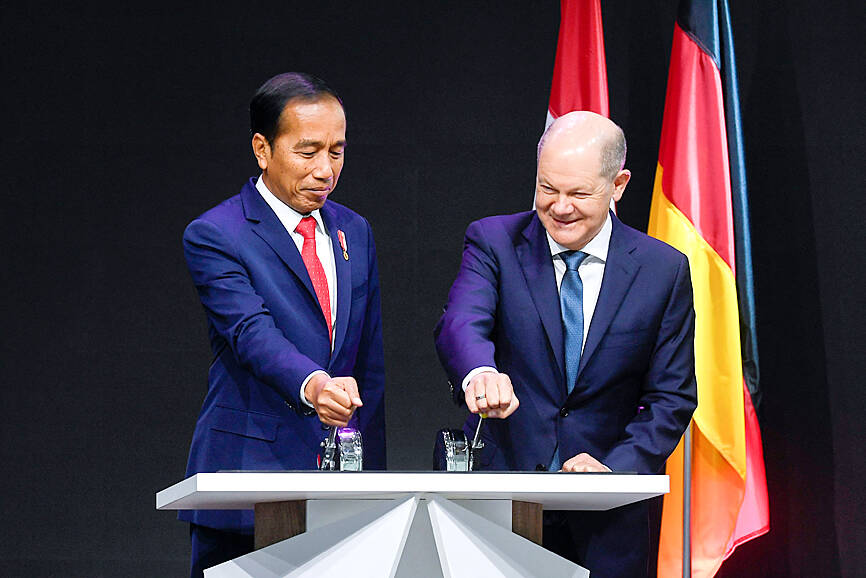German Chancellor Olaf Scholz on Sunday said that he would press for a trade agreement between the EU and Indonesia as part of his country’s efforts to reduce its reliance on China for crucial raw materials.
Speaking at the opening of the annual Hannover Messe trade fair, Scholz told Indonesian President Joko Widodo that a trade deal between Southeast Asia’s most populous nation and the 27-nation bloc would create an economic area with 700 million people.
“I am working to finally get this agreement across the finish line,” Scholz said of the negotiations between Jakarta and Brussels, which have been ongoing since 2016.

Photo: Reuters
The German leader said he was similarly hopeful about talks between the EU and the Mercosur bloc in South America, as well as Australia, Kenya, Mexico and India.
“Here too, a whole new dynamic has emerged in recent months,” he said, adding that such agreements were necessary to help countries reduce their dependence on particular markets.
Germany is particularly concerned about becoming too reliant on China, including for crucial commodities needed for digitalization and the shift toward a zero carbon economy.
“At the moment we import many of them from China,” Scholz said.
“And that’s despite the fact that rare earth, copper or nickel are often not extracted there, but in countries such as Indonesia, Chile or Namibia,” he said. “We want to change that.”
Building processing facilities for such raw materials in the countries where they are found would benefit the local economy and should be part of any new trade deal, he said
Indonesia is the partner country of this year’s Hannover Messe, one of the world’s largest trade fairs.
At the fair, Federation of German Industries president Siegfried Russwurm yesterday said that China is and will remain a key market for German companies.
“We have a broad consensus that we need China,” Russwurm said.
Additional reporting by Reuters

Nvidia Corp chief executive officer Jensen Huang (黃仁勳) on Monday introduced the company’s latest supercomputer platform, featuring six new chips made by Taiwan Semiconductor Manufacturing Co (TSMC, 台積電), saying that it is now “in full production.” “If Vera Rubin is going to be in time for this year, it must be in production by now, and so, today I can tell you that Vera Rubin is in full production,” Huang said during his keynote speech at CES in Las Vegas. The rollout of six concurrent chips for Vera Rubin — the company’s next-generation artificial intelligence (AI) computing platform — marks a strategic

REVENUE PERFORMANCE: Cloud and network products, and electronic components saw strong increases, while smart consumer electronics and computing products fell Hon Hai Precision Industry Co (鴻海精密) yesterday posted 26.51 percent quarterly growth in revenue for last quarter to NT$2.6 trillion (US$82.44 billion), the strongest on record for the period and above expectations, but the company forecast a slight revenue dip this quarter due to seasonal factors. On an annual basis, revenue last quarter grew 22.07 percent, the company said. Analysts on average estimated about NT$2.4 trillion increase. Hon Hai, which assembles servers for Nvidia Corp and iPhones for Apple Inc, is expanding its capacity in the US, adding artificial intelligence (AI) server production in Wisconsin and Texas, where it operates established campuses. This

US President Donald Trump on Friday blocked US photonics firm HieFo Corp’s US$3 million acquisition of assets in New Jersey-based aerospace and defense specialist Emcore Corp, citing national security and China-related concerns. In an order released by the White House, Trump said HieFo was “controlled by a citizen of the People’s Republic of China” and that its 2024 acquisition of Emcore’s businesses led the US president to believe that it might “take action that threatens to impair the national security of the United States.” The order did not name the person or detail Trump’s concerns. “The Transaction is hereby prohibited,”

Garment maker Makalot Industrial Co (聚陽) yesterday reported lower-than-expected fourth-quarter revenue of NT$7.93 billion (US$251.44 million), down 9.48 percent from NT$8.76 billion a year earlier. On a quarterly basis, revenue fell 10.83 percent from NT$8.89 billion, company data showed. The figure was also lower than market expectations of NT$8.05 billion, according to data compiled by Yuanta Securities Investment and Consulting Co (元大投顧), which had projected NT$8.22 billion. Makalot’s revenue this quarter would likely increase by a mid-teens percentage as the industry is entering its high season, Yuanta said. Overall, Makalot’s revenue last year totaled NT$34.43 billion, down 3.08 percent from its record NT$35.52